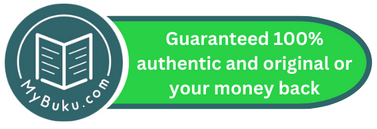Malaysian Laws on Poisons and Sale of Drugs [As At 1st September 2024] - 9789678930543 - ILBS
- Regular price
- RM31.88
- Regular price
-
RM37.50 - Sale price
- RM31.88
- Unit price
- per
Product Description
Detailed Contents Of Malaysian Laws on Poisons and Sale of Drugs :
The laws governing the control and sale of poisons and drugs in Malaysia are the Poisons Act 1952 and the Dangerous Drugs Act 1952. These laws have been amended over time to address emerging issues related to the use, sale, and distribution of poisons and drugs.
Poisons Act 1952:
The Poisons Act 1952 regulates the manufacture, import, export, sale, and possession of poisons in Malaysia. The Act classifies poisons into three categories:
Schedule I poisons - These are highly toxic substances that are not used for medical purposes. Examples include cyanide, arsenic, and strychnine.
Schedule II poisons - These are substances that are used for medical purposes but can be harmful if not used correctly. Examples include morphine, cocaine, and codeine.
Schedule III poisons - These are substances that are used for medical purposes and are not considered to be harmful if used correctly. Examples include paracetamol and aspirin.
Under the Poisons Act 1952, it is illegal to manufacture, import, export, sell, or possess any Schedule I or II poison without a license. Schedule III poisons can be sold without a license, but sellers are required to keep records of all transactions.
The Act also requires all poisons to be labeled with a warning label indicating that the substance is a poison and the precautions that need to be taken when handling it. Failure to comply with these requirements is an offense and can result in fines, imprisonment, or both.
Dangerous Drugs Act 1952:
The Dangerous Drugs Act 1952 regulates the possession, manufacture, import, export, and trafficking of dangerous drugs in Malaysia. The Act classifies dangerous drugs into three categories:
Group A drugs - These are drugs that are considered to be highly addictive and have no recognized medical value. Examples include heroin, cocaine, and methamphetamine.
Group B drugs - These are drugs that are considered to be less addictive than Group A drugs but still have no recognized medical value. Examples include cannabis and ecstasy.
Group C drugs - These are drugs that have recognized medical value but can be abused if not used correctly. Examples include morphine, codeine, and methadone.
Under the Dangerous Drugs Act 1952, it is illegal to possess, manufacture, import, export, or traffic any Group A or Group B drug without a license. Group C drugs can be possessed and used for medical purposes, but a license is required for their manufacture, import, export, or trafficking.
The Act also provides for the establishment of the National Anti-Drug Agency (NADA) to coordinate efforts to prevent drug abuse and to provide rehabilitation services for drug addicts.
Penalties:
The penalties for offenses under the Poisons Act 1952 and the Dangerous Drugs Act 1952 can be severe. Offenders can face fines, imprisonment, or both, depending on the severity of the offense. In some cases, the death penalty can be imposed for offenses related to the trafficking of dangerous drugs.
Conclusion:
In summary, the Poisons Act 1952 and the Dangerous Drugs Act 1952 provide a framework for the control and sale of poisons and drugs in Malaysia. These laws are designed to protect the public from the harmful effects of poisons and drugs and to prevent their abuse. It is important for individuals and businesses involved in the manufacture, import, export, sale, or possession of poisons or drugs to comply with these laws to avoid the serious consequences of non-compliance.
Recently Viewed Products
- Regular price
- RM31.88
- Regular price
-
RM37.50 - Sale price
- RM31.88
- Unit price
- per
- Regular price
- RM65.00
- Regular price
-
RM65.00 - Sale price
- RM65.00
- Unit price
- per
- Regular price
- RM118.86
- Regular price
-
RM144.95 - Sale price
- RM118.86
- Unit price
- per
![Malaysian Laws on Poisons and Sale of Drugs [As At 1st September 2024] - 9789678930543 - ILBS Malaysian Laws on Poisons and Sale of Drugs [As At 1st September 2024] - 9789678930543 - ILBS](http://mybuku-com-8888-2.myshopify.com/cdn/shop/files/Malaysian_Laws_on_Poisons_and_Sale_of_Drugs_As_At_1st_September_2024_-_9789678930543_-_ILBS.webp?v=1729234653)
![Malaysian Laws on Poisons and Sale of Drugs [As At 1st September 2024] - 9789678930543 - ILBS Malaysian Laws on Poisons and Sale of Drugs [As At 1st September 2024] - 9789678930543 - ILBS](http://mybuku-com-8888-2.myshopify.com/cdn/shop/files/Malaysian_Laws_on_Poisons_and_Sale_of_Drugs_As_At_1st_September_2024_-_9789678930543_-_ILBS_compact.webp?v=1729234653)

![Malaysian Laws on Poisons and Sale of Drugs [As At 1st September 2024] - 9789678930543 - ILBS](http://mybuku-com-8888-2.myshopify.com/cdn/shop/files/Malaysian_Laws_on_Poisons_and_Sale_of_Drugs_As_At_1st_September_2024_-_9789678930543_-_ILBS_533x.webp?v=1729234653)

